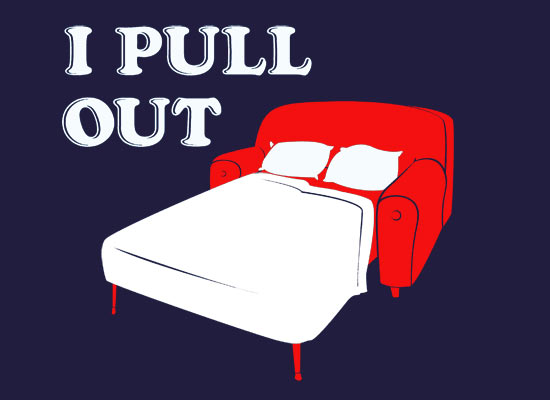Pull Out Method of Birth Control used by 1 in 3 Young Women
New research from the Duke University Medical Center, published in the September issue of Obstetrics & Gynecology, shows that 31 percent of sexually active women ages 15 to 24 have used withdrawal as a form of birth control. It’s not quite as dire as the headline at US News—”1 in 3 Young U.S. Women Uses ‘Withdrawal’ For Birth Control”—would suggest. If a woman used this method just once, she was counted in the research, and plenty of study participants had used other forms of birth control during other sexual encounters.

The Pull Out Method
Still, the study’s results are worrisome because women who had relied on their partners to “pull out,” even sporadically, instead of more reliable and controllable methods—such as hormonal contraception or condoms—had higher unintended pregnancy rates than women who hadn’t. Twenty-one percent of the pull-out crowd had experienced an unintended pregnancy, compared to 13 percent of women who never relied on their partner to get out of town. Withdrawal users were also more likely to have had to use emergency contraception. One of the more interesting findings is that the “sometimes this, sometimes that” approach was just as bad, possibly even slightly worse than relying on withdrawal exclusively:
Women who relied on the withdrawal method, which depends upon a man “pulling out” (hopefully) before ejaculating, as their only form of birth control, tended to be less likely to get pregnant than women who used withdrawal along with other forms of birth control over the course of the study, but [Dr. Annie] Dude said this finding was not statistically significant.
This suggests that the problem here is more than withdrawal itself, which other research from the Guttmacher Institute shows is only slightly less effective than condoms in the hands of the typical user (which is health research code for “inconsistent and often sloppy”—used perfectly, condoms perform much better than withdrawal). It might also be that use of withdrawal suggests an overall pattern of inconsistent contraception use. Unfortunately, the patchwork approach—going on and off the pill, trying to remember to have condoms on hand but often forgetting, refusing to have condoms on hand unless you’re sure it’s going to happen, and, if all else fails, hoping he pulls out on time—is all too common, as this study suggests.
The reasons for this are complex, but better access to contraception for the 15-24 couldn’t hurt. As much as the right would like to pretend otherwise, not everyone has a Planned Parenthood within walking distance, or the ability to get to one with regularity. However, it’s also likely that part of the problem is cultural. As Sesali Bowen at Feministing writes:
Additionally, some women may not be able to or know how to insist that a resistant partner use a condom. And the constant attack on women’s sexuality and choices via religion, conservatism, and patriarchy is indeed affecting whether or not women are taking control of their family planning.
 Nosy and judgmental parents, lack of privacy, and the youthful fear of standing up for yourself in bed are almost surely contributors to the patchwork approach. Unless the world has drastically changed in the few years since I was single and young, young women are reluctant to go on the pill or have condoms on hand while single, lest parents see them as failures or partners see them as “sluts.” And I highly doubt that the world has been cleansed of guys who try to talk their way out of wearing a condom. Yes, yes, young women “should” be strong and empowered and never, ever worry about impressing the guy they’re eager to sleep with, but that “should” appears to be doing very little to prevent unintended pregnancy. Which is why things like the HHS rule requiring insurance companies to cover contraception—including the ones that are the least time-consuming and easiest to hide but also happen to cost the most upfront, such as shots and the IUD—can do a lot to offer young women physical protection when the superhuman strength we expect of them all the time fails in the heat of the moment.
Nosy and judgmental parents, lack of privacy, and the youthful fear of standing up for yourself in bed are almost surely contributors to the patchwork approach. Unless the world has drastically changed in the few years since I was single and young, young women are reluctant to go on the pill or have condoms on hand while single, lest parents see them as failures or partners see them as “sluts.” And I highly doubt that the world has been cleansed of guys who try to talk their way out of wearing a condom. Yes, yes, young women “should” be strong and empowered and never, ever worry about impressing the guy they’re eager to sleep with, but that “should” appears to be doing very little to prevent unintended pregnancy. Which is why things like the HHS rule requiring insurance companies to cover contraception—including the ones that are the least time-consuming and easiest to hide but also happen to cost the most upfront, such as shots and the IUD—can do a lot to offer young women physical protection when the superhuman strength we expect of them all the time fails in the heat of the moment.
In the UK if you’re under 25 your local authority and family planning unit, has options to get as many condoms as you need as well as females on the NHS having free access to all forms of contraception.





